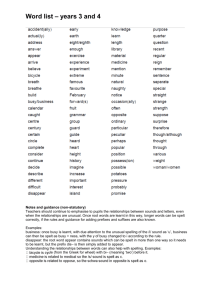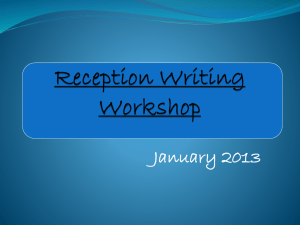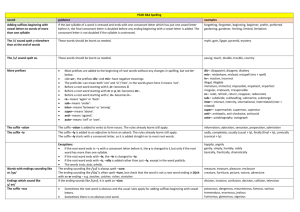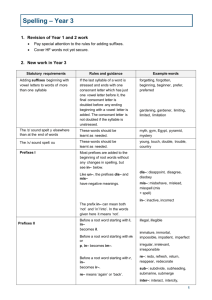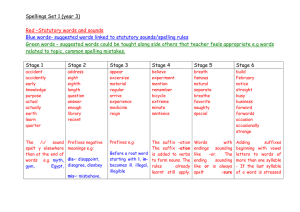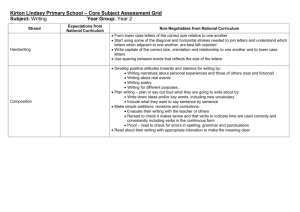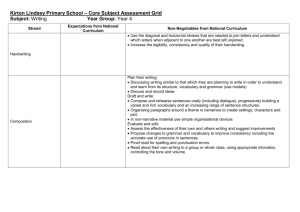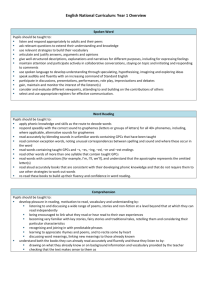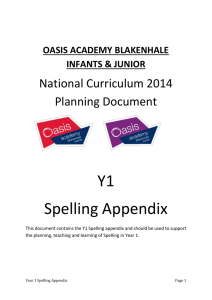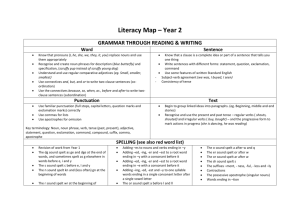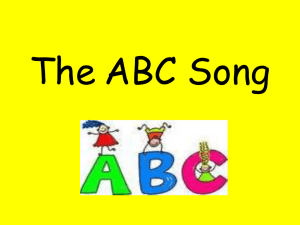Spelling – Year 1 - Bridlewood Primary School
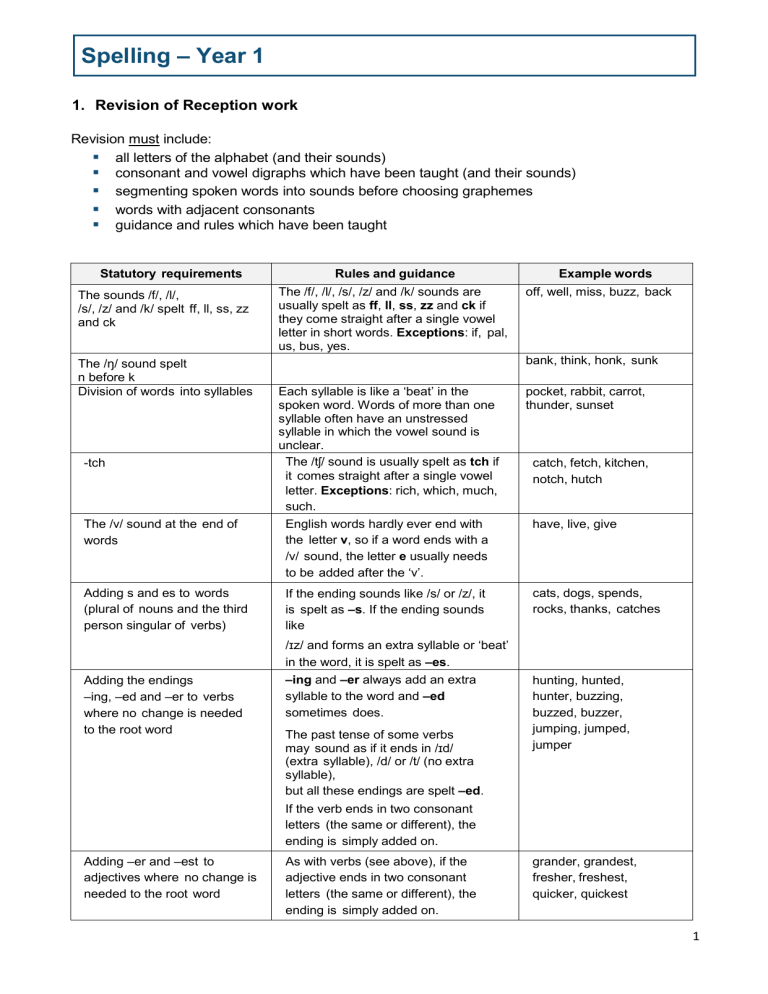
Spelling – Year 1
1. Revision of Reception work
Revision must include:
all letters of the alphabet (and their sounds)
consonant and vowel digraphs which have been taught (and their sounds)
segmenting spoken words into sounds before choosing graphemes
words with adjacent consonants
guidance and rules which have been taught
Statutory requirements Rules and guidance Example words
The sounds /f/, /l/,
/s/, /z/ and /k/ spelt ff, ll, ss, zz and ck
The /f/, /l/, /s/, /z/ and /k/ sounds are usually spelt as ff , ll , ss , zz and ck if they come straight after a single vowel letter in short words. Exceptions : if, pal, us, bus, yes.
The /ŋ/ sound spelt n before k
Division of words into syllables Each syllable is like a ‘beat’ in the spoken word. Words of more than one syllable often have an unstressed
-tch syllable in which the vowel sound is unclear.
The /t ʃ/ sound is usually spelt as tch if it comes straight after a single vowel letter. Exceptions : rich, which, much, such.
The /v/ sound at the end of words
English words hardly ever end with the letter v , so if a word ends with a
/v/ sound, the letter e usually needs to be added after the ‘v’. off, well, miss, buzz, back bank, think, honk, sunk pocket, rabbit, carrot, thunder, sunset catch, fetch, kitchen, notch, hutch have, live, give
Adding s and es to words
(plural of nouns and the third person singular of verbs)
Adding the endings
–ing, –ed and –er to verbs where no change is needed to the root word
If the ending sounds like /s/ or /z/, it is spelt as –s . If the ending sounds like
/ ɪz/ and forms an extra syllable or ‘beat’ in the word, it is spelt as –es .
–ing and –er always add an extra syllable to the word and –ed sometimes does. cats, dogs, spends, rocks, thanks, catches hunting, hunted, hunter, buzzing, buzzed, buzzer, jumping, jumped, jumper
The past tense of some verbs may sound as if it ends in / ɪd/
(extra syllable), /d/ or /t/ (no extra syllable), but all these endings are spelt –ed .
If the verb ends in two consonant letters (the same or different), the ending is simply added on.
Adding –er and –est to adjectives where no change is needed to the root word
As with verbs (see above), if the adjective ends in two consonant letters (the same or different), the ending is simply added on. grander, grandest, fresher, freshest, quicker, quickest
1
2. New work in Year 1
Vowel digraphs and trigraphs
NB Some may have already been covered in Reception.
Statutory requirements ai, oi i ay, oy a e o u
–e
–e
–e
–e
–e
Rules and guidance
The digraphs ai and oi are virtually never used at the end of English words. ay and oy are used for those sounds at the end of words and at the end of syllables.
Both the /u:/ and /ju:/ (‘oo’ and ‘yoo’) sounds can be spelt as u –e . ar ee ea (/i:/) ea (/ ɛ/) er (/ ɜ:/) er (/ ə/) ir ur oo (/u:/)
Example words rain, wait, train, paid, afraid oil, join, coin, point, soil day, play, say, way, stay boy, toy, enjoy, annoy made, came, same, take, safe these, theme, complete five, ride, like, time, side home, those, woke, hope, hole
June, rule, rude, use, tube, tune car, start, park, arm, garden see, tree, green, meet, week sea, dream, meat, each, read (present tense) head, bread, meant, instead, read
(past tense)
(stressed sound): her, term, verb, person
(unstressed schwa sound): better, under, summer, winter, sister girl, bird, shirt, first, third turn, hurt, church, burst,
Thursday food, pool, moon, zoo, soon oo (/ ʊ/) oa oe ou ow
(/a ʊ/) ow
(/ əʊ/) ue e
Very few words end with the letters oo , although the few that do are often words that primary children in year 1 will encounter, for example, zoo
The digraph oa is very rare at the end of an
English word.
The only common English word ending in ou is you .
Both the /u:/ and /ju:/ (‘oo’ and ‘yoo’) sounds can be spelt as u –e , ue and ew. If words end in the
/oo/ sound, ue and ew are more common spellings than oo . book, took, foot, wood, good boat, coat, road, coach, goal toe, goes out, about, mouth, around, sound now, how, brown, down, town own, blow, snow, grow, show blue, clue, true, rescue, Tuesday new, few, grew, flew, drew, threw
2
Statutory requirements ie (/a ɪ/) ie (/i:/) igh or ore aw au air ear ear (/ ɛə/) are (/ ɛə/)
Rules and guidance
Other spelling patterns and words
Statutory requirements
Words ending –y (/i:/ or /ɪ/)
New consonant spellings ph and wh
Rules and guidance
The /f/ sound is not usually spelt as ph in short everyday words (e.g. fat , fill , fun ).
Using k for the /k/ sound
Adding the prefix
–un
Compound words
Common exception words
The /k/ sound is spelt as k rather than as c before e , i and y .
The prefix un – is added to the beginning of a word without any change to the spelling of the root word.
Compound words are two words joined together.
Each part of the longer word is spelt as it would be if it were on its own.
Pupils’ attention should be drawn to the grapheme- phoneme correspondences that do and do not fit in with what has been taught so far.
Example words lie, tie, pie, cried, tried, dried chief, field, thief high, night, light, bright, right for, short, born, horse, morning more, score, before, wore, shore saw, draw, yawn, crawl author, August, dinosaur, astronaut air, fair, pair, hair, chair dear, hear, beard, near, year bear, pear, wear bare, dare, care, share, scared
Example words very, happy, funny, party, family dolphin, alphabet, phonics, elephant when, where, which, wheel, while
Kent, sketch, kit, skin, frisky unhappy, undo, unload, unfair, unlock football, playground, farmyard, bedroom, blackberry the, a, do, to, today, of, said, says, are, were, was, is, his, has, I, you, your, they, be, he, me, she, we, no, go, so, by, my, here, there, where, love, come, some, one, once, ask, friend, school, put, push, pull, full, house, our – and/or others, according to the programme used e.g.HF words.
Bridlewood/S.E.Parsons/Oct.2014
3
